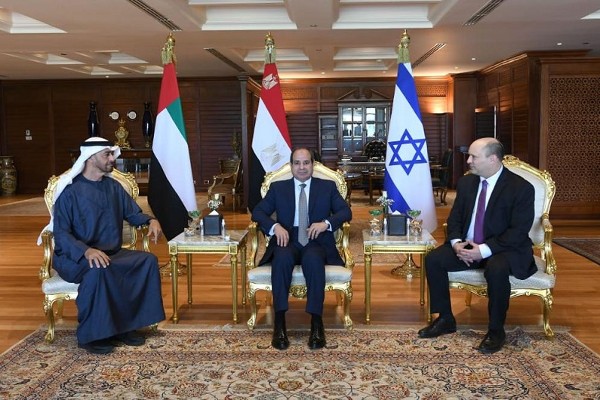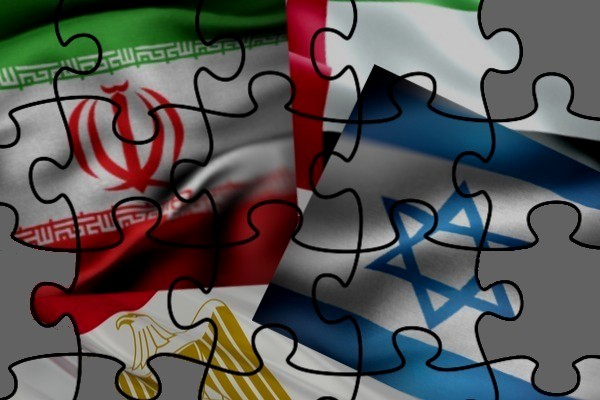Prime Minister Naftali Bennett held unannounced talks with Egyptian President and Emirati Crown Prince on Monday.
By Pesach Benson, United With Israel
Israeli Prime Minister held unannounced talks in Sharm el-Sheikh with Egyptian President Abdel Fattah el-Sissi and United Arab Emirates Crown Prince Mohammed bin Zayed al-Nahyan on Tuesday.
Bennett’s visit to Sharm el-Sheikh was ostensibly to mark the resumption of direct flights between the Sinai resort town and Ben Gurion International Airport.
But Israel Hayom reported that “the real reason for it was all three sides’ anger at the US over the progression of the nuclear talks with Iran and the Biden administration’s willingness to remove Iran’s Islamic Revolutionary Guards Corps from its list of terrorist organizations.”
Haaretz described the meeting as “part of an effort to forge a coalition with American backing among countries that in the past were considered adversaries of Israel – including Egypt, the Gulf states and Turkey – that would notably stand together against Iran.”
Israel and numerous Arab states oppose the U.S. returning to the JCPOA nuclear agreement with Iran.
Iran reportedly has enough highly enriched uranium to build two nuclear bombs in just four weeks.
Washington has reportedly acknowledged to Israel that Iran is a “nuclear threshold state” in terms of uranium production and blamed former President Donald Trump’s decision to withdraw from the JCPOA for Tehran’s advances.
U.S. officials previously stressed to Jerusalem that failing to revive the JCPOA would leave the Iranians weeks away from accumulating the materials needed for a nuclear bomb, as opposed months away under the terms of the current negotiations.
Israel and the Arab opponents of the JCPOA also fears that a premature lifting of sanctions will enable Tehran to boost its support for terror proxies across the Middle East. Removing sanctions would give Tehran access to around $100 billion in frozen assets.
The lifting of sanctions would also give Iran fresh revenue from oil sales. Iran stands to make an estimated $55 billion from selling oil, and that profit will likely be higher with the war in Ukraine triggering higher energy prices.

From right, Prime Minister Naftali Bennett, Egyptian President Abdel Fattah al-Sisi and Crown Prince of Abu Dhabi Mohammed bin Zayed meeting in Sharm El-Sheikh, March 22, 2022. (Prime Minister’s Office)
Israel Poised for Regional Leadership Role?
Haaretz also reported that Israel is trying to convince the Saudis and Emiratis to boost oil production to counteract rising oil prices and international dependence on Russian oil.
The Saudis have been reluctant, but on Monday, the kingdom’s state-run Aramco said it increase production to meet the demand.
The paper added that Israel wants to help Egypt find alternative sources of wheat. The majority of the country’s wheat is imported from Ukraine. Rising wheat prices stemming from Russia’s invasion are taking a toll on the Egyptian economy.
According to recent report in the Wall St. Journal, Saudi and Emirati leaders have not been taking phone calls from U.S. President Joe Biden. Officials feel the emerging JCPOA nuclear agreement ignores their security needs.
They are also angered that the Biden administration is considering removing the IRGC from the State Department’s list of Foreign Terror Organizations. The IRGC oversees Iran’s relations with proxy terror groups like Hamas, Hezbollah, Houthi rebels, and Shi’ite militias in Iraq. This includes weapons, funding and training.
